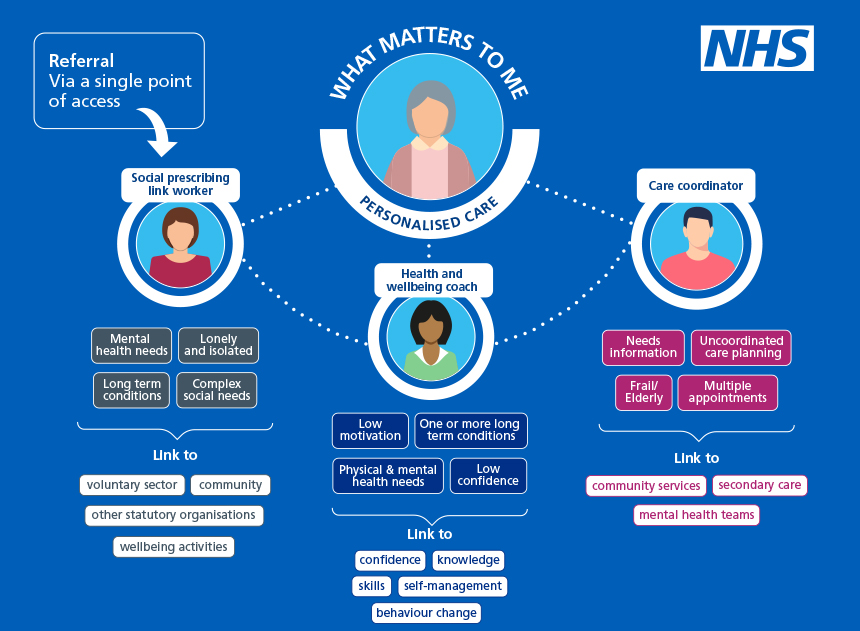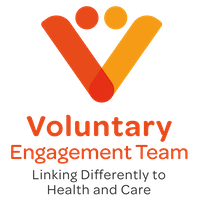New roles
As part of the NHS Long Term Plan to deliver personalised care to 2.5 million people living in the UK by 2023/4, a series of specialist roles have been created to help people access the support and advice they need.

Dr Sadie Aubrey, GP and PCN Clinical Director, talks about why the new Personalised Care roles are so valuable in Primary Care.
Click on the links below to find out more about these exciting new roles:
Social Prescribing Link Workers
Social prescribing Link Workers (SPLWs) are becoming an integral part of Multi-Disciplinary Teams in Primary Care Networks (PCNs). They assist in delivering non-medical care through referrals, working in partnership with other agencies, local authorities and community groups.
In this video, Chey Brown, Social Prescribing Lead for Lincolnshire Community Voluntary Services talks about her role and the impact it has on the people she supports.
Useful Links
Social Prescribing in Lincolnshire
www.personalisedcareinstitute.org.uk/about-us-social-prescribing-link-workers
Care Coordinators
Care Coordinators work alongside GPs and other primary care professionals within Primary Care Networks (PCNs) to provide extra capacity, support and expertise to patients who are having clinical conversations. They ensure that their individual needs are addressed and that appropriate support is provided by creating a single personalised care plan. Care Coordinators will also take into account local priorities, health inequalities and population health management risk stratification.
Care Coordinators working in primary care networks - YouTube
Improving health through personalised care
Evidence shows that people will have better experiences and improved health and wellbeing if they can actively shape their own care and support. One of the main commitments in the Long Term Plan is that: “People will get more control over their own health and more personalised care when they need it”.
Care coordinators are one of several new roles that support this commitment. They do this by:
- providing a more joined-up and coordinated care journey for people, instead of each encounter with services being seen as a single, unconnected ‘episode’ of care
- acting as a single point of contact for people to navigate the health and care system
- breaking down traditional barriers between health and care organisations, teams and funding streams, to support the increasing number of people with long-term health conditions reducing health inequalities within the local population and providing solutions to ensure equity of health care is delivered.
Click here to see Jo Yeoman's talking about her role as a care coordinator.
Useful Links
www.personalisedcareinstitute.org.uk/about-us-care-coordinators
A day in the life of a Lincolnshire Care Co-ordinator
| Thumbnail | Title | Size |
|---|---|---|
| Care Coordinator Welcome Pack | 1,080.23 KB |
Health & Wellbeing Coaches
Health and Wellbeing Coaches use health coaching skills to establish a one-to-one partnership with individuals in their care, in order to improve levels of ‘patient activation’. They take a supportive and non-judgemental approach to help people develop the knowledge, skills and confidence to become advocates for their own care so that they can achieve their health and wellbeing goals. Their open approach is designed to encourage the person to self-identify issues and subsequent treatment options, making people more active in their health and care.
Useful Links
www.personalisedcareinstitute.org.uk/about-us-health-and-wellbeing-coaches
| Thumbnail | Title | Size |
|---|---|---|
| HWBC Welcome Pack | 1,087.57 KB |
Peer Support Workers
Peer Support Workers are people who have lived experience of mental health challenges themselves. They use these experiences and empathy to support other people and their families receiving mental health services. Peer support workers join other members of someone’s care team to help support their wellbeing and provide inspiration for their recovery.
Useful Links
Peer support worker | Health Careers
A day in the life of a Peer Support Worker :: Lincolnshire Partnership NHS Trust (lpft.nhs.uk)
| Thumbnail | Title | Size |
|---|---|---|
| The Competence Framework for MH PSWs - Part 1 - Supporting document | 2,435.55 KB |
Clinical Pharmacists
Clinical Pharmacists are increasingly working as part of general practice teams. They are highly qualified experts in medicines and can help people in a range of ways. This includes carrying out structured medication reviews for patients with ongoing health problems and improving patient safety, outcomes and value through a person-centred approach.
In the video below, Joshua - one of LPFT's specialist mental health pharmacists - talks about his role supporting neighbourhood teams, primary care and secondary care colleagues across Lincolnshire.
Useful Links
Mental Health Practitioners
Mental Health Practitioners are experienced Mental Health Clinicians drawn from AHPs, Nursing etc. They work in the heart of the communities within the Integrated Place Based Teams to support people with Mental Health issues lead the best quality of life they can.













